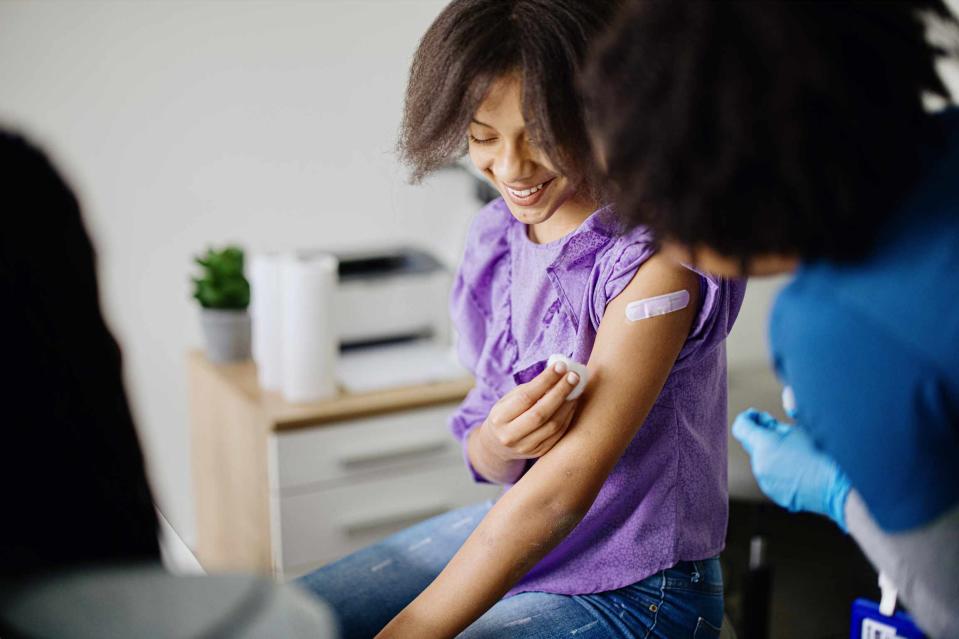PSA to Parents: New Study Shows the HPV Vaccine Works
The data shows long-term protection against HPV-related illnesses and cancers, such as cervical cancer, in vaccinated patients.

Anchiy / Getty Images
Fact checked by Sarah Scott
Your teen or preteen may dread getting shots. In particular, the Human Papillomavirus (HPV) vaccine is said to be a painful one. But parents, listen up, there's new research that shows it's worth it. It sheds light on the efficacy and safety of GARDASIL 9, a vaccine designed to protect against cancers and diseases related to HPV later in life.
The peer-reviewed research, published September 5 in Pediatrics, showed that children who received a three-dose vaccine regimen at 9-15 years old had sustained HPV antibody responses 10 years later. Not only that, but they had not experienced HPV-related high-grade disease, specific cancers, or genital warts. From a safety standpoint, no participants reported any serious adverse events or deaths linked to GARDASIL 9.
Healthcare providers are encouraged by the results of the study.
“The new study shows sustained immunogenicity, meaning maintenance of the anti-HPV antibody 10 years after vaccination,” says Preeti Parikh, MD, a board-certified pediatrician and the executive medical director at GoodRx. “To simplify, the HPV maintains effectiveness for 10 years after vaccination. This leads to reduced rates of HPV-associated cancers in patients who received the vaccine.”
The vaccine has been a target of anti-vaccine and hesitancy, partly because it is recommended for people ages 11 to 12 and can be started at 9, per the Centers for Disease Control and Prevention (CDC).
“The vaccine has been controversial due to the relation of HPV to STIs [sexually transmitted infections] and the need to give it to patients prior to sexual debut,” explains Zachary Hoy, MD, a board-certified pediatric infectious disease specialist and medical director at Pediatrix Medical Group in Nashville, Tennesse. “The vaccine can lead to difficult but important conversations.”
However, Dr. Hoy and other providers agree the study adds evidence to the vaccine’s importance, which can help prompt conversations between parents, children, and doctors.
Related: The Most Important Vaccines for Children: An A-Z List for Parents
Effectiveness of the HPV Vaccine
Elmar Joura, MD of the Medical University of Vienna, the base study investigator, explains that the long-term follow-up (LTFU) study was conducted between 2009 and 2021 across 13 countries and five continents. Researchers followed 971 girls and 301 boys (1,272 participants) who received their three-dose series between the ages of 9-15. Participants had not initiated sexual activity before receiving their third dose.
The results demonstrated the vaccine’s effectiveness at sustained protection against HPV-related cancers and diseases, as well as its safety. “The results of this study are very reassuring for parents who have already vaccinated their children and also for those considering HPV vaccination of their children in the near future,” says Dr. Joura, who vaccinated all four of his children.
One of the study’s limitations was that there wasn’t a control group. However, experts say that’s common in research like this study.
“This study intervention group was compared against other study control groups,” says Mundeep Kainth, DO, MPH, a pediatric infectious disease doctor at Northwell Health’s Cohen Children’s Medical Center. “This was done because the HPV vaccine is recommended for everyone, and it is not ethical to have a control group that is unvaccinated.”
Dr. Kainth believes the research and findings add to the evidence that the HPV vaccine is safe and effective. “It shows long-term data that the HPV vaccine works to prevent acquiring viruses that cause cervical cancer,” Dr. Kainth says. “Vaccine protection is long-lasting to protect against viruses 10 years after initial vaccination.”
What Is HPV?
Dr. Parikh explains HPV is a term for a group of more than 200 viruses. Typically, the viruses don’t cause cancer. Research from 2021 notes that 80-90% of HPV infections clear spontaneously in about two years.
“But in about 10 percent of cases, these viruses don’t resolve themselves and can lead to cellular mutation, increasing the risk of cancer,” says Dr. Parikh. “These cancers include cervical, anal, mouth and throat, vulvar, vaginal, and penile cancer.”
Unfortunately, HPV spreads easily, and symptoms often go unnoticed. “Many individuals are infecting others without knowing they even have the virus. This also makes it harder to know that you need to seek treatment,” Dr. Parikh says.
Dr. Kainth says that HPV-related complications can cause the need for hysterectomy, leading to infertility. “The best way to prevent cancer is to prevent acquiring the virus in the first place,” Dr. Kainth says.
Experts understand that parents may have concerns, including because of the misinformation about the vaccine. Resources are available to help.
“If parents have concerns, they should make specific appointments with their child's pediatrician to specifically discuss this vaccine,” Dr. Hoy says, adding that pediatricians can counsel parents on the timing of the vaccine. “They can look to the CDC website for general answers and information.”
Related: FDA Approves RSV Vaccine for Pregnant People To Protect Newborns
For more Parents news, make sure to sign up for our newsletter!
Read the original article on Parents.

